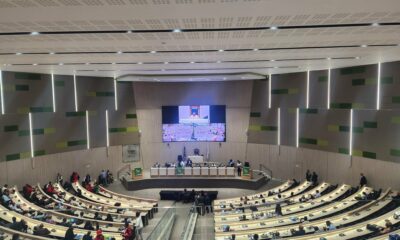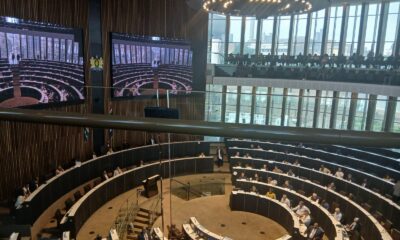News
EFF Accuses AmaPanyaza of Being a ‘Jobs-for-Votes’ Scheme After Legal Claim

A Clash Over the Law Behind AmaPanyaza
In Gauteng, a political firestorm is igniting around AmaPanyaza, Premier Panyaza Lesufi’s Crime Prevention Wardens. The EFF says its creation was illegal from the start. The flashpoint: a statement by KZN police boss Lieutenant-General Nhlanhla Mkhwanazi before Parliament, remarking that the unit was not lawfully established.
EFF’s Gauteng chair, Nkululeko Dunga, seized on these comments. He says they prove what his party has long argued, that AmaPanyaza lacks any legal basis. Dunga charges that from day one, the unit failed to meet the definitions or protections required for a policing body.
“Jobs for Votes” or Public Safety?
For the EFF, this debate is about more than legality. It’s about motive. Dunga claims AmaPanyaza was cooked up ahead of the 2024 elections as a political recruitment drive, not a serious public safety project. He says many wardens were pulled in via ANC connections, and some allegedly engaged in party work while on duty.
Furthermore, EFF members say the wardens operate under dangerous and unfair conditions. They point out that, unarmed, undertrained, and without legal protection, some have even died while doing the work. Dunga asserts that transforming policing into patronage threatens the integrity of law enforcement.
Government Pushes Back
Unsurprisingly, the Gauteng government rejects the EFF’s framing. Spokesperson Elijah Mhlanga says the wardens are valid by law, designated as peace officers under Section 334 of the Criminal Procedure Act. In the government’s view, that gives them the same powers as traffic officers. Mhlanga insists that AmaPanyaza was always grounded in the constitution’s cooperative governance principles.
The province also notes that the wardens are part of a broader crime-fighting and job creation plan. The government has said it sees no value in engaging in sweeping and, in their words, baseless legal claims.
Why This Fight Matters
At stake here is trust in the institutions. When political parties weaponise state roles, public confidence weakens. The EFF’s framing taps into a broader frustration many South Africans feel: that the rules are often bent for political gain.
On social media, reactions are mixed. Some support the EFF view, calling it overdue accountability. Others defend Lesufi’s efforts, insisting crime demands bold tactics. Still others are sceptical: they say both sides use rhetoric while basic safety, policing, and oversight suffer.
This battle over AmaPanyaza isn’t just about a warden force. It’s about who gets to guard the guard and under what rules.
Also read: Once Africa’s Beacon: Why Johannesburg’s Golden Glow Is Fading
Follow Joburg ETC on Facebook, Twitter, TikT
For more News in Johannesburg, visit joburgetc.com
Source: IOL
Featured Image: Pretoria News



























